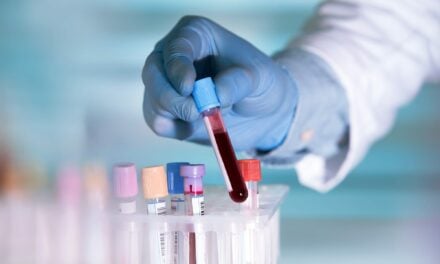 Scott Tomlins MD PhDA new urine test for prostate cancer that measures minute fragments of RNA is now commercially available to men nationwide through the University of Michigan MLabs, Ann Arbor, Mich, according to the Prostate Cancer Foundation, Santa Monica, Calif.
Scott Tomlins MD PhDA new urine test for prostate cancer that measures minute fragments of RNA is now commercially available to men nationwide through the University of Michigan MLabs, Ann Arbor, Mich, according to the Prostate Cancer Foundation, Santa Monica, Calif.
The test—Mi-Prostate Score (MiPS)—improves the utility of the PSA blood test, increases physicians’ ability to pick out high-risk prostate tumors from low-risk tumors in patients, and may help tens of thousands of men avoid unnecessary biopsies.
The MiPS test incorporates blood PSA levels and two molecular RNA markers specific for prostate cancer in one final score that provides men and their physicians with a personalized prostate-cancer risk assessment.
Drawbacks of stand-alone PSA testing for prostate cancer
The prostate specific antigen (PSA) is a protein made by the prostate. For decades the PSA test has been used as a marker for the presence of prostate cancer in men—high or rising levels of PSA in blood may indicate the presence of a prostate tumor. However, the PSA test is a nonspecific test for prostate cancer. That is, noncancerous conditions such as an enlarged or inflamed prostate can cause elevations in PSA levels. And even when PSA levels rise above what has routinely been considered a trigger level (4.1 ng/ml in the blood) indicating the need for a needle biopsy to check prostate tissue for signs of cancer, less than half of those biopsies find cancerous cells. In addition, up to 44% of PSA-triggered biopsies find cancer cells that are nonlethal, indolent prostate cancer cells. Indolent prostate cancer is highly unlikely to shorten the lifespan of a man. However, treatment with surgery or radiation can carry significant risk of side effects such as incontinence or sexual dysfunction.
Improving upon the PSA test
The limited reliability of the PSA test, and its lack of specificity for prostate cancer, has led to sharp disagreement over the use of the PSA test as a routine health screening measure for men of a certain age. What everyone does agree upon is the need for better markers of prostate cancer. To date there are no perfect biomarkers that identify only high-risk prostate cancer. But each year progress is made toward such a goal.
The MiPS test scans urine samples for two molecular markers that are distinct to prostate cancer. One marker is a snippet of RNA made from a gene (PCA3) that is overactive in 95% of all prostate cancers. The second marker is RNA that is made only when two genes (TMPRSS2 and ERG) abnormally fuse. The presence of this fusion RNA in a man’s urine is ultra specific for prostate cancer.
An ultra-specific test for prostate cancer
Scott Tomlins, MD, PhD, is an assistant professor of pathology and urology, University of Michigan, and a Safeway-Prostate Cancer Foundation Young Investigator. Tomlins co-discovered what is now commonly known as the TMPRSS2:ERG fusion. “The evidence shows that if TMPRSS2:ERG RNA is detectable at high levels in urine, a man likely has prostate cancer, whether or not his biopsy is positive for cancer,” said Tomlins. (Because biopsies typically sample less than 1% of the prostate gland, cancers can be missed, even high-grade cancers.)
A commercial urine test (PROGENSA PCA3) for PCA3, developed and marketed by Gen-Probe, San Diego, now part of Hologic, gained FDA approval in 2012 for use in men who are considering repeat biopsy after an initially negative result. While a welcome development, research shows that the new urine test offered by MLabs that measures both PCA3 and TMPRSS2:ERG should improve a physician’s ability to stratify men suspected of having prostate cancer. In a study published in Science Translational Medicine, Tomlins and colleagues found the highest rates of cancer in men with the highest levels of TMPRSS2:ERG and PCA3 in their urine. The men in the study were stratified into three groups based upon the levels of TMPRSS2:ERG and PCA3 in their urine: low, intermediate and high levels, or scores. Cancer was diagnosed in each of the groups respectively: 21%, 43%, and 69%. High-grade prostate cancer, defined in the study as a Gleason score greater than 6, also occurred at different frequencies in the three groups with 7%, 20%, and 40% diagnosed in each group respectively.
Other research has shown that the two-marker urine test is more effective than the PSA test alone, or PSA testing that’s incorporated into a commonly used online tool (the Prostate Cancer Risk Calculator), at predicting the presence of prostate cancer.
Click here for additional research results of the MiPS test, how results will be presented to men and their physicians, and other background information.
An editorial that accompanied the study in Science Translational Medicine, stated: “Here Tomlin’s et al. improve on the PSA test by taking a new twist on a known gene fusion…demonstrating more accurate, individualized stratification of men at high risk for developing clinically significant prostate cancer.” The editorial concludes that the combination urine test may help men and their doctors better estimate how urgently a biopsy is needed after a suspect PSA test.
Howard Soule, PhD, the chief science officer at the Prostate Cancer Foundation, says, “The hope with this new urine test is that it will lead to a more informed decision tree for men and their doctors without upticks in detection of incidental prostate cancers.”
From more information on how to send a specimen, call MLabs at 800-862-7284 or click here.
The Prostate Cancer Foundation is not endorsing the use of this test or non-use—PCF does not endorse commercial companies or products. The Foundation applauds each research step made toward precision medicine and better biomarkers for prostate cancer that improves the standard of care for patients and leads to less suffering and death from this disease that will affect one in six men in the US. The Safeway Foundation generously provided unrestricted funding to the Prostate Cancer Foundation for biomarker research that funded this work. The Safeway Foundation also provided PCF-Young Investigator funding to Tomlins. The Prostate Cancer Foundation is the world’s largest philanthropic source of support for accelerating promising research for better treatments and cures for prostate cancer.
[Source: Prostate Cancer Foundation]




